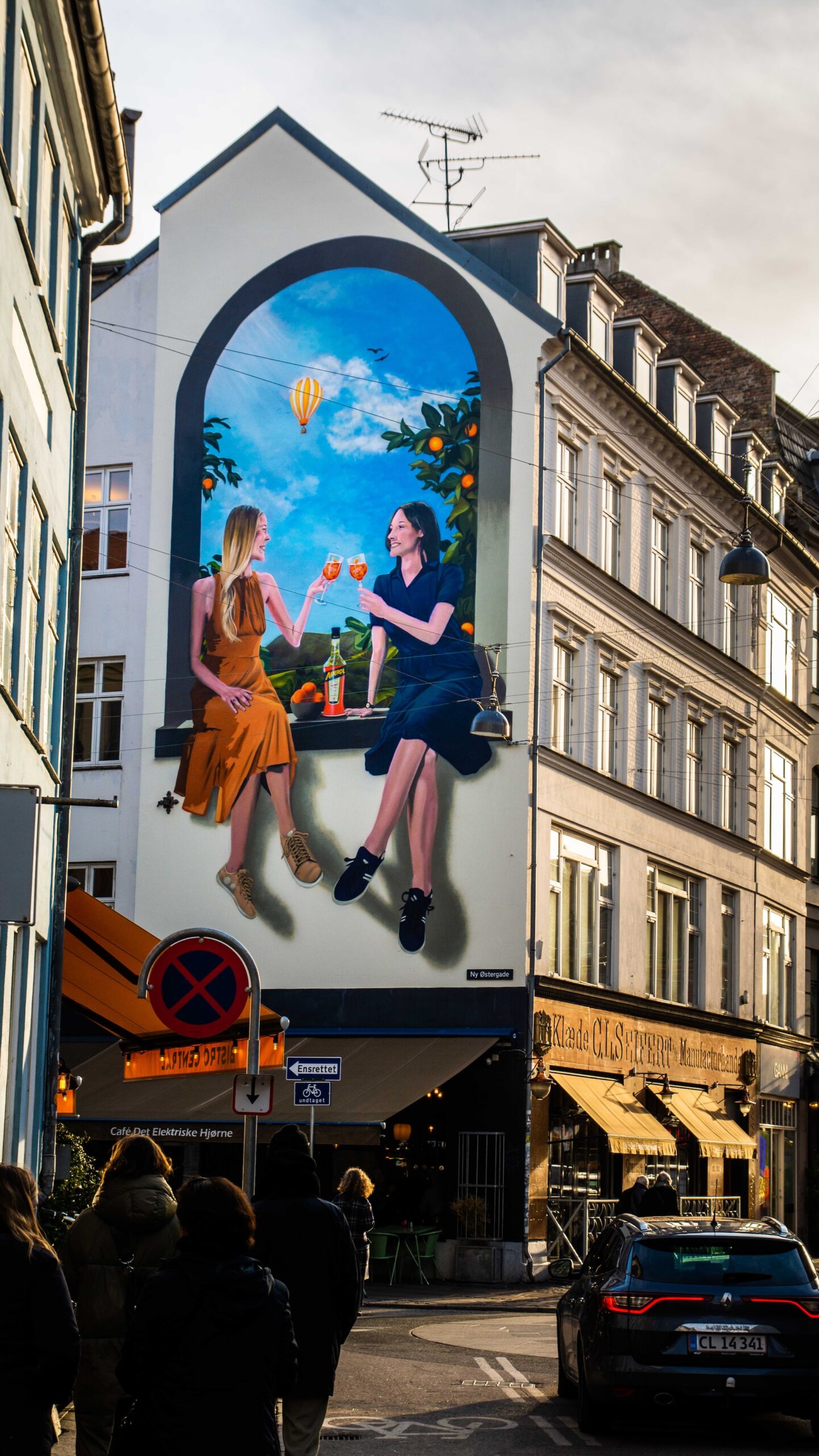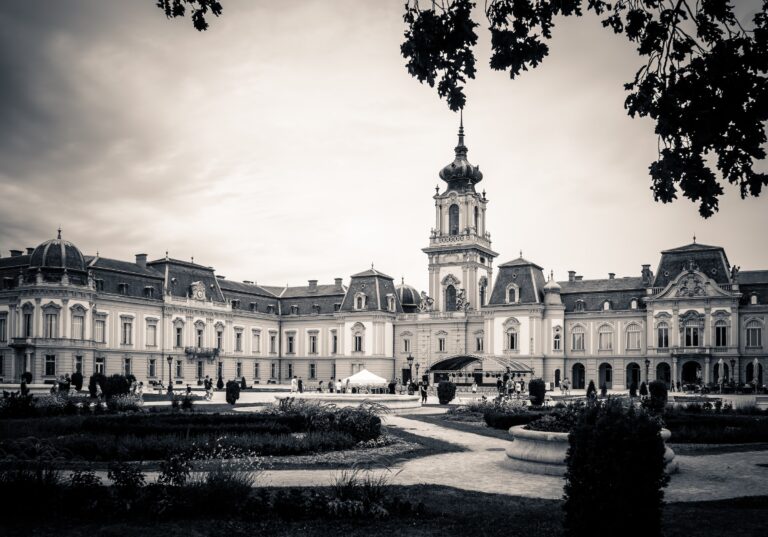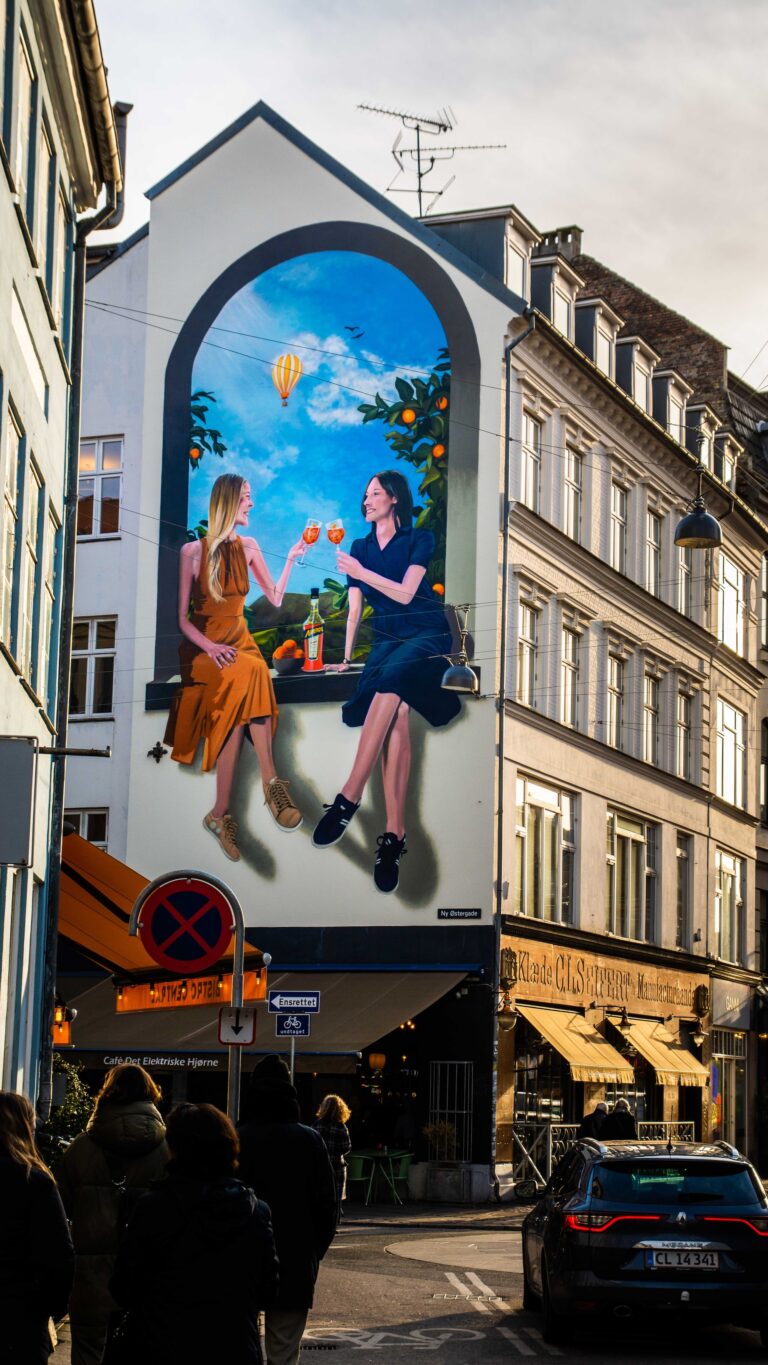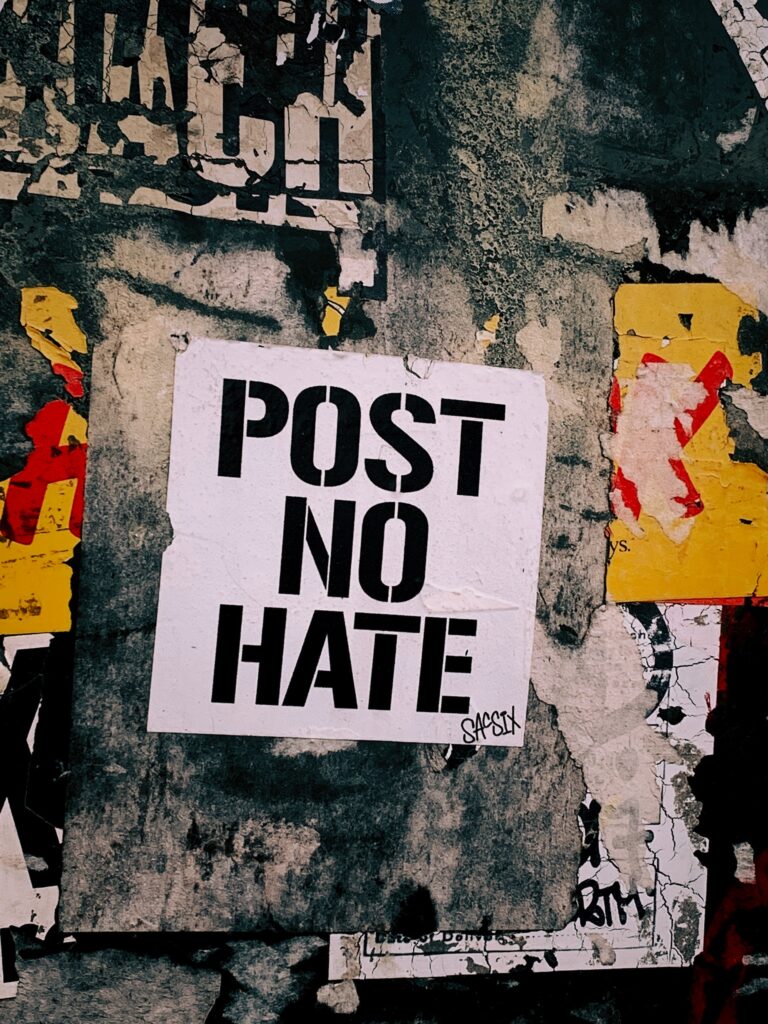I’m a psychologist and I work in a café. Yes, these two things do not fit perfectly, and yes, it does get tedious to serve multiple coffees a day and answer the same questions about the WiFi password again and again. No, it’s not the job I had dreamt of, yet Denmark still reminds me to be more patient. The pleasure I find in my job is always related to the people I talk to – particularly to those who often visit the café. One of the moments of great mutual satisfaction is when I succeed in memorizing what type of coffee the regular customers would like to get. It’s quite remarkable just how much this simple gesture on my part can open the door to more honest talks about everyday battles that in any other case would be described in terms of “oh, what awful weather today” and a short sigh.
One of my favorite regular customers, Camilla, owns a shop on the same street and usually visits the café on Tuesdays or Wednesdays. I’ve been serving her flat white for over a year now, and she has been kind enough to practice Danish with me. Usually she starts off with a simple “how are you?” to which I almost always reply, “I’m okay, thank you.” It wasn’t until a Tuesday a few weeks ago when she commented with a slight smile: “It’s interesting how you always reply you’re just okay, you know?” I was quite baffled. Truth be told, I was feeling okay while having our morning talks, yet somehow I felt that my honest answer had struck a rude tone.
Something within me made my shoulders shrug and my mouth gave Camilla an awkward smile. “It must be because of the weather”, I replied, then continued: “if we had more sun in Denmark, you would hear me saying ‘I’m great every day!’” She laughed as if I had just told her a great joke, and walked away from the counter shortly after, leaving me with a sprouting, uneasy feeling that perhaps it’s not okay to feel simply ‘okay.’
I
Denmark scored second in 2023’s World Happiness Report and was preceded only by Finland – a result that, similarly to the previous years, shouldn’t come as a surprise. The report, drawing on global survey data from people in over 150 countries, takes into account six key variables: income, social support, healthy life expectancy, generosity, freedom to make life choices, and freedom from corruption. If you try putting the words ‘Scandinavian’ and ‘happy’ together in your search engine, chances are you’ll come across multiple articles trying to decode the worldwide phenomenon of Scandinavians and their inclination to be almost impossibly content for most of their existence.
Some researchers suggest that Nordic happiness is genetically predisposed and is an outcome of having more “happy” biomarkers than the other world regions. The more convincing reasoning, however, puts focus on the environment and the role of trust, which, in the case of Scandinavian societies, is remarkably high on both governmental and personal levels. I could also argue that feeling satisfied with one’s life can be a result of the self-fulfilling prophecy: to live in one of the Nordic countries means, quite literally, to live in one of the happiest places on the planet. Maybe it’s easier to convince yourself of having a happy life when the whole world expects you to do so, when all your countrymen say, “in Denmark we’re happy”?
Such was my case. Moving to Denmark just before the outbreak of the COVID-19 pandemic, however much stressful and uncertain, was one of the most hopeful and exciting moments of my twenties. There I was, standing in the doorway of my dorm room in Roskilde, red-brown bricks everywhere, waiting for my worries and doubts to magically go away. Unlike Poland – although equally gloomy in terms of weather, yet somehow always seeming “not happy enough” – I deeply believed Denmark posed a chance for me to escape some of my everyday miseries. Because people were nicer. Because buildings were cleaner. Because, at least in theory, everyone was equal. And while I stand by some of these reasons to this day, I also dare to say that apart from being a “welfare state paradise,” Denmark does have plenty of space for misery – and perhaps it’s a good thing.
II
What is so alluring about happiness anyway? Why is it that, for centuries, we have been constantly attempting to reach the desired state of being contented, if not ecstatic? When approaching an ancient concept, to introduce its history is a helpful method to come closer to a possible answer. If we look at the civilizations of ancient Greece and Rome and the tremendous impact their teachings and discoveries have had on the European societies of today, it’s fair to assume that we can trace this focus on happiness, in its mature form, back to the ancient philosophers. In the works of Aristotle, where he reflected on how we should live as individuals in communities, he asks: What exactly is a happy life for a human being? And although the nature of a “happy life” can be difficult to grasp, Aristotle managed to provide us with some relevant answers.
According to Aristotle’s works, happiness can be found in virtuous rational activities, that is, in practicing the dispositions of insightfulness, understanding and theoretical wisdom. Hence happiness is not a thing that can be simply “possessed”; rather, it manifests itself through a kind of condition when all human actions are thought of to have reached their goal, and where nothing is lacking. We are happy when we can see the purposefulness of our actions and when we know that these actions will lead us to something worthwhile in itself. Millennia later, this interpretation of happiness still makes a central claim to a well-lived life.
When taking a look at the world we live in today, however, it seems that the definition of happiness offered by the philosopher has been seriously misconceived, even outright repudiated. In recent decades, as many of us intuit, “being happy” has lost its major trait of purposefulness; instead, the dominant cultural narrative has started to link happiness to more materialized sources, making it appear almost as a product that all of us have to possess. And It’s true that on an individual level, happiness – or, put in more psychological terms “high subjective well-being” – is generally associated with thriving in multiple economic aspects and general life satisfaction. On a collective level, happy citizens translate to a safe, trusting and flourishing state, which in turn help foster more happy citizens. A positive circle. Such outcomes can well justify the general tendency to value happiness and make it one of the most desired currencies on today’s world market. But we can, and should, paint a more nuanced picture.
There’s been a growing number of research suggesting an increase in societal pressure to feel happy. Truly, we pose an easy target for the countless “happiness coaches,” the seemingly ideal lives of social media influencers, and the ever-smiling campaigns or ads that pop up constantly on most digital screens from metro stations to a TV in a clinic’s waiting room. We’re under a constant barrage of be happy! consumption; that is to say, to “be happy” in a very particular and precise way, with little room for anything else. Yet the question remains: what exactly does such selectivity mean for our mental health? Closer still: is a purely instrumental and material view of life ever able to bring about happiness?
III
Our inner worlds are able to contain way more emotional states than the always longed-for state of happiness. Furthermore, the realities we live in don’t resemble the ones presented to us on social media – there are many sharp turns and obstacles that we simply have to encounter on our paths every now and then and which trigger occasional feelings of anxiety, stress or sadness. In a sense, this is what makes us human.
It seems puzzling, then, that despite the fluctuating nature of life and experienced emotional states, some emotions remain heavily stigmatized. Referring to them as “maladaptive to our mental well-being” or simply “troublesome” imposes a strong belief that anything that is not happiness, needs an instant cure and is something of a low societal desire. But placing feelings of anger or sadness on the negative end of the emotional spectrum amounts to a misguided judgment from our culture, ultimately leaving us with no choice but to repress any feelings that are not considered positive. Eventually, and ironically, the constant failure to live up to the unrealistic emotional standards puts our mental well-being in jeopardy.
To put it in different terms: a lot of our experienced miseries tend to originate in comparisons. It’s a mechanism that can go both ways. We either try to “elevate” our achievements by comparing ourselves with people who struggle, or, more frequently, we perceive our life as less “worthy” or successful basing it on our look at other people’s sugar coated reality that is presented to us on multiple social media platforms; often forgetting what’s real. Such comparisons, combined with the growing popularity of world happiness reports, clearly is one of the key factors contributing to an increasing number of people who suffer from anxiety, stress, or depression.
Quite a few research-reports that have investigated the downsides of calling some nations “happier” than others build these statements up. In fact, one such report proposes a rather bold theory that the omnipresent pressure to be happy actually can be linked to more mental health issues. The data collected from multiple countries (all of them ranked in the World Happiness Report discussed earlier) shows that, first of all, the perceived societal premium of happiness (and aversion of sadness) relates paradoxically to fewer and less intense experiences of positive emotions; and, secondly, feeling pressured to be happy as well as not sad is particularly associated with poor well-being in countries with high national happiness levels.
A nuanced look at the reality we live in, I think, should lead us to the conclusion that it’s fair to say that such findings shouldn’t be surprising. After all, in the world of happy people around us, it’s easy to feel that we’re failing and can’t keep up. Hence it creates a dynamic of its own whereby life becomes about being happy in a specific way, excluding other ways, and just that. Happiness, in other words, is instrumentalized.
But are we really failing?
Socially unaccepted emotions make us feel ashamed or seed a thought in our mind that something is wrong with us. And I firmly believe that such a narrative should be flipped. Feelings of anger or sadness are a natural part of everyone’s life and simply have to be experienced, as they can act as very important markers by teaching us where the limits of human life are and thus help us navigate through reality. They also enable us to evaluate the experienced happenings and have always been a key to our survival.
We feel upset when somebody has breached our boundaries and made us feel uncomfortable. We’re sad when we have lost something or someone that was playing an important role in our life. And we feel anxious when we’re not sure about what the future will hold – and how we will handle it. In short, they teach us and protect us. A distinction is in order, though. The Danish philosopher and theologian Knud Ejler Løgstrup reminds us in The Ethical Demand (Den etiske fordring, Aarhus, 2010, p. 42-50) that we need to distinguish between emotions, such as anger and hatred. The former is a righteous indignation about something unjust in the world and thus points outwards, as he says: “Anger’s pathos is moral,” whereas the latter is a self-centered and destructive emotion about revenge and thus points inwards.
Keeping this in mind, we can say that while it’s important to cultivate the joy and gratitude we experience in our everyday life because they can benefit our mental health, unpleasant feelings – rightly understood – are just as crucial as the enjoyable ones in helping us make sense of life through its ups and downs. Only this is edifying, uplifting, which brings us back to Aristotle who shares this holistic approach with many modern psychologists.
In his works on ethics, dwelling on the topic of virtues, Aristotle circulates around the phrase “in the middle state between.” That, in many ways, is a key insight to a life of fulfillment. Such thinking has been followed by further believers and practitioners of eudaimonic approaches, which put strong emphasis on a sense of meaning, personal growth and proper understanding of the goals that we set and that require us to confront all of life’s dimensions. Because Aristotle’s psychology of the human soul, and the virtues it represents, is based on avoiding extremes on both ends – and can easily be referred to the emotional inner world and the spectacle of feelings that happens constantly within each of us today.
Just as our body grows when meeting resistance in the gym, so too our mental lives need some resistance in order to fully develop. We have to be able to harmonize and transform our positive and negative emotions into an activity so as to be able to live them out in our daily lives. Therefore, to give both of them (without forgetting the aforementioned distinction) an equally important role in our lives is a vital task, we all have to undertake in the course of our conscious being. A task that, if performed successfully, can almost certainly guarantee us a life worth living. Only the person who is able to live out his or her wisdom is wise, and happy.
IV
Many shifts have passed since the memorable Tuesday at the café where I dared to say I’m simply “okay” and not “great.” Camilla still comes every now and then and I always put extra effort into preparing her a flat white, almost as if I wanted to redeem myself and my honest faux pas by steaming the milk perfectly. We always greet each other with a smile – it’s a custom I’m the most fond of here in Denmark. At the same time, I have been practicing living out my honesty with other customers; and over the course of the last month when asked how I am, I have admitted to feeling tired, happy, or slightly stressed.
And I urge the larger society to appreciate that all of us are on a quest to find a way to act upon our own emotional balance, or with Aristotle: mean, whether grand happiness reports appreciate this or not. – A thing that, in my understanding, is definitely more than “okay.”





